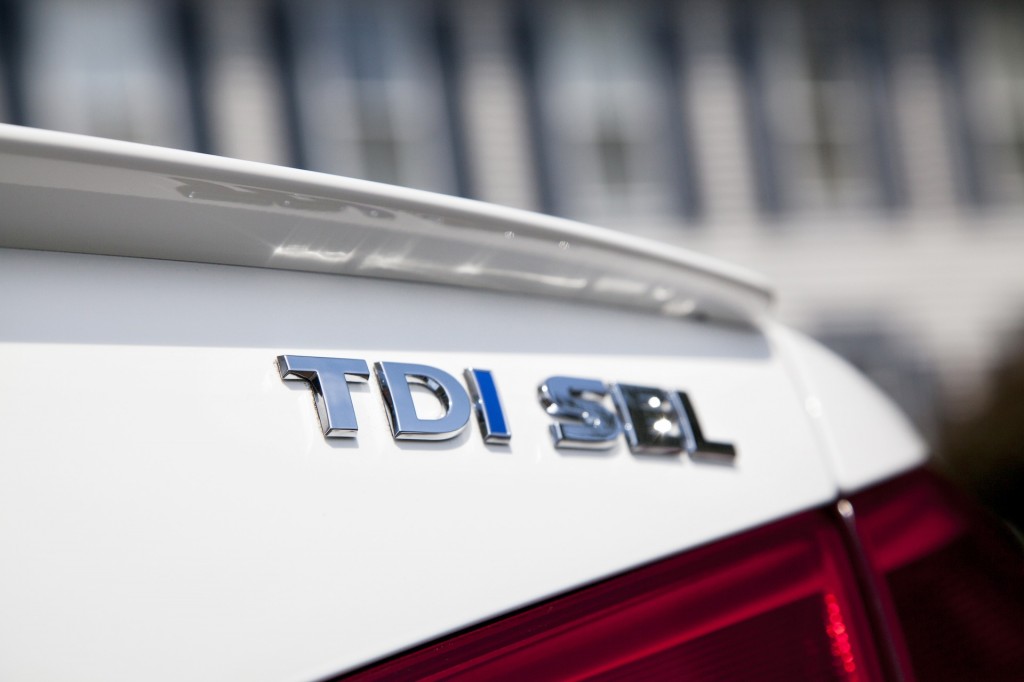
2014 Volkswagen Passat TDI
Only one out of four vehicle owners think favorably of Volkswagen this week, in the wake of the brand’s diesel emissions scandal.
It’s yet another indicator that the brand, which saw three out of four opinions favorable before scandal, faces a long, tough road to earn back consumer trust. Even the companion VW Group automaker Audi, which used the affected engines in one of its models, the A3, has seen its reputation plummet, to 29 percent now, versus 69 percent previously.
The figures are from the California market-research firm AutoPacific, and based on a survey of 500 U.S. vehicle owners.
It’s all due, of course, to Volkswagen’s admission, two weeks ago, that it cheated on U.S. emissions tests, with the installation of a software-based “defeat device” that allowed VW’s so-called Clean Diesel TDI four-cylinder engines to emit up to 40 times the nitrogen oxides allowed by the law.
Volkswagen faces fines, class-action lawsuits, and investigations from many other governments. And as such, it’s a bit different than any safety-related recall, or a quality issue, and difficult for some consumers to see the situation as anything but intentional deceit.
Sales stopped, as have the Clean Diesel cheers
The automaker has stopped selling the affected vehicles, yet it argues that the vehicles are safe to drive (and that might not even be true if you have pollution-based public-health concerns).
For the brand, the results are catastrophic, as they’ve made some loyal legions of buyers incensed and remorseful. Prior to the diesel scandal, three out of four owners had a positive opinion of Volkswagen; in the wake of the scandal, as owners of affected vehicles wait for VW to announce a fix (and reimbursement scheme).
“Volkswagen was a tremendous catalyst in the marketing of diesel engines as being clean and fuel efficient,” said Ed Kim, AutoPacific’s VP of industry analysis. “Their marketing efforts over the past several years not only improved consumer opinions about the performance of diesels in the U.S., but also sold consumers on the environmental friendliness of their vehicles.”
AutoPacific found that about 80 percent of respondents classified the issues as “a big deal,” while only eight percent thought that it would lead to the demise of the diesel market in the U.S.

2014 Volkswagen Passat TDI
A significant portion of consumers do however think that the emissions issue is less severe than GM’s ignition-related recalls and Toyota’s accelerator-related issues of recent years.
Volkswagen and Audi combined were on track for having 87 percent of the U.S. diesel passenger-car market; and for those two brands combined, diesels made up 17 percent of total sales in 2014. Monthly sales returns for September are already showing a hit for VW, with the brand’s overall sales about flat versus last year as some rival brands report double-digit gains.
Are there more vehicles part of the scandal?
Consumers are leery that the announced vehicles aren’t the only ones affected by the deceptive engineering. Among the respondents, 64 percent thought that in light of this issue, they don’t trust Volkswagen, and the same percentage believe that other automakers are using defeat devices on their diesels.
Even 55 percent thought that some gasoline vehicles are affected by such devices.
VW’s reputation will likely make a reasonable recovery after this issue is properly addressed. But will those buying habits return to the same levels of diesels? And will the brand have the same level of trust? That’s all a bit harder to imagine.
_______________________________________












